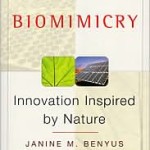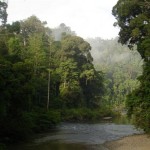Nuclear Powered Malaysia
By Ian Hall
Nuclear Power has been in the Malaysian news recently after the government gave the go ahead for a nuclear power plant to begin operating from 2021
Environmentalists and NIMBY’s are usually vocal in their opposition to such announcements and indeed the Malaysia Nature Society has been debating the issue for some time before the government announcement. As an environmentalist and a disciple of James Lovelock I felt the need to weigh in on the debate with a letter to the editor of Malaysian Naturalist magazine which was published last month
* * * * * * * * * * * * *
Sir,
I have read in Malaysian Naturalist recently arguments against nuclear power. This has prompted me to write a letter to the editor to come out of the closet as an environmentalist who is in favour of nuclear power.
I don’t believe that we can change our energy consumptive behaviour quickly enough to avoid climate change. Therefore we need an instant low carbon way to generate power. Nuclear power seems to be the only technology that we have available right here, right now, that can do the job.
Opponents will talk of alternatives; but wind, hydro, tidal and biomass all have their own environmental costs or are unproven, solar is promising but does not work at night, hydrogen is not so much a source of power as a good way to store it and clean coal does not exist. Only natural gas seems viable as our other option for a low carbon fuel.
The high cost of disposing of radioactive waste is often highlighted as a downside of nuclear power. In fact I see this as contributing to its credibility. Nuclear power generation is one of the few industries that is forced to pay the environmental clean up costs of its operation. Most other industries cut and run leaving others to deal with their mess.
Of course any debate about nuclear power eventually comes down to one key factor; we’re scared of it. My feeling is that although the dangers are real, they are over-exaggerated by paranoia. I liken this to the relative danger of air travel versus car travel. Many more people are killed by car travel but in our minds air travel is much more dangerous because each incident is more catastropic.
Then finally we come to the issue closest to my heart which is environmental conservation. For this point I refer you to an ongoing debate about the wildlife that apparently thrives in the exclusion zone around Chernobyl (the site of the world’s most catastropic nuclear accident). The science is still unclear as to exactly how much damage has been caused to wildlife at Chernobyl but analysis seems clear on one thing; that the benefits to wildlife of removing people from the zone, have far outweighed any harm from radiation.
In this I support James Lovelock (Author of the Gaia Theory) by saying, let’s dump our low level nuclear waste in the rainforest. It will cause far less environmental damage than logging or plantations and we can turn paranoia about nuclear power to the benefit of conservation by keeping people away from the area. We will also have responsibly generated low carbon energy to keep up with demand.
Sincerely
Ian Hall
* * * * * * * * * * * * *
Further reading:
Environmentalists For Nuclear Energy
The Mystery of Chernobyl







Your comments about peoples fear of nuclear power is only part of the story. I got interested in this area some years ago and found much research had been done on risk perception. Googling “risk perception” now shows that research is still ongoing but the basis has not changed much. One article# identifies nine factors that are the basis of perception of risk, summarised as:
Voluntariness of risk: do people get into these risky situations voluntarily?
Immediacy of effect: to what extent is the risk of death immediate
Knowledge of risk: to what extent are the risks known precisely by the persons who are exposed to those risks?
Knowledge of risk: to what extent are the risks known to science?
Control over risk: if to what extent can you, by personal skill or diligence, avoid death while engaging in the activity?
Newness: are the risks new, novel ones or old, familiar ones?
Chronic – catastrophic: is this a risk that kills people one at a time or a risk that kills large numbers of people at once?
Common – dread: is this a risk that people have can think about calmly, or is it one that people have great dread for?
Severity of consequences: how likely is it that the consequence will be fatal?
In peoples’ minds, nuclear power often scores highly on most of these factors explaining why it csn be viewed with suspicion.
# http://www.svt.ntnu.no/psy/Torbjorn.Rundmo/Cultural_theory.pdf
Hi Ian,
Read your views with interest especially in parallel with thoughts on the proposed coal plant in Sabah. I am in tentative nervous agreement with you.
As you write, the paranoia surrounding nuclear may actually insure that a project of this nature may actually, for once, be carried out properly with full regulations followed. I doubt a ‘small’ 300MW coal plant near Lahad Datu would be built with the standards of the 2100MW coal plant at Tanjung Bin, for example.
Also i do fear biomass as i suspect it will simply encourage more people to convert their dusuns to oil palm plantations and i am uncertain what the wastes of biomass actually are.
So yeah, nuclear – done properly – maybe perhaps nervously, can’t believe i’m writing this, should perhaps be considered for Sabah.
Thanks for your article
I-lann
Nuclear power is a complex issue and one liable to confuse those who cherry pick a few benefits. Let’s re-examine your argumentatation.
Climate change, in ecological terms, is essentially a problem of pollution: too many greenhouse gases (GHGs) to sustain the present comfortable margin of human life. The simplest formulation of the problem being the substitution of GHG-releasing power sources plus the removal of GHGs from the atmosphere to a target like say 350ppm CO2 equivalent.
And to prevent climate change, you are willing to embrace an energy ‘solution’ that, like fossil fuels, leaves persistent pollutants in the biosphere for and even longer timespan (hundreds of thousands of years as opposed to thousands). On this basis of principle your environmentalism appears selective, and I would charge Mr Lovelock with the same. The prospect of climate jeopardy has somehow led you and other environmentalists to discount their environmental principles.
This process of revision and rejuggling would be fine, rational even, if it weren’t so focused on such a selective rendition of nuclear power.
So your proposed solution is to substitute nuclear for existing and future energy sources because it is an “instant low carbon” form of power, and because you don’t expect human behaviour to change in time. A nuclear power station takes between 10 – 20 years to come online, often with significant construction cost overruns. This already puts us very close to the 2050 deadline cut GHG emissions by about 80%. Nuclear is not going to be fast enough.
Bear in mind also that nuclear power plants often run at sub-par efficiency. Newer generation plants in the UK run between 40-75% efficiency. This means either a shortfall in electricity, or an enormously increased expenditure to keep up with demand.
You say:
“The high cost of disposing of radioactive waste is often highlighted as a downside of nuclear power. In fact I see this as contributing to its credibility. Nuclear power generation is one of the few industries that is forced to pay the environmental clean up costs of its operation. Most other industries cut and run leaving others to deal with their mess.”
Your highly speculative logic here doesn’t hold up. The high cost of disposing of radioactive waste means that decommissioning processes are often stalled for lack of sufficient finance as well as insurmountable safety concerns. The United States still lacks a comprehensive nuclear waste storage facility. The one at Yucca Mountain was supposed to solve the national problem of nuclear waste being stored in the open, but it has been cancelled due to safety fears and local opposition.
You cannot reasonably assume 100% compliance with the law or international best practice, especially in the Malaysian regulatory environment.
Malaysia already has had a negative experience with radiation regulation and public health in the Asian Rare Earth case in Bukit Merah, Perak. Public authorities told residents that the thorium waste being dumped behind their villages was entirely safe, which was not the case as babies were being born with mutations, leukemia, etc. Despite winning the initial hearing in court, political interference turned the courts against the plaintiffs and they were subsequently arrested under the ISA.
This incident does not instill any confidence in the fairness and responsibility of local authorities to oversee radioactive waste disposal.
As for your incredible suggestion to dump nuclear waste in the rainforest, may I remind you that you yourself have said that the “science is still unclear as to exactly how much damage has been caused to wildlife at Chernobyl”. How can you make such an irresponsible suggestion when you admit scientific ignorance of the consequences? Our rainforest is also not bereft of human users and inhabitants. We have done more than enough damage to it without turning it into a nuclear waste dump.
The US National Academy of Sciences has concluded that there is no safe level of radiation. Even at low exposures negative health impacts such as cancers can result. Leukaemia, blood disorders, spontaneous abortions, stillbirth, and increased chances of heart disease, diabetes mellitus, arthritis, asthma, and allergies are some of the common ailments associated with radiation poisoning.
This is your solution to climate change?
You cannot run away from the fact that the root causes of anthropogenic climate change lie in the behaviour of industrial humans. And electricity only counts for around 50% of emissions in industrialised nations. This means that if you were to entirely substitute coal and gas plants with nuclear, or even renewables, you would only address 50% of the problem and still be unable to prevent dangerous climate change. The rest of emissions are caught up in the production, transport and consumption of manufactured goods, including our food. There is no getting away from the fact that our behaviour and production systems need to change if climate change is to be averted. Nuclear is an unsafe and insufficient magic bullet.
Thanks for your thoughts I-lann. Yes, it’s a thorny issue and as Keith points out in his comment; the contents of my letter are just the tip of the iceberg of many complex issues, represented here in concise soundbites for the benefit of a short provocative letter.
Thanks Shao for responding. I’m learning and exploring and I want this nuclear thing argued out. It IS another option. May be a bad one, but still I do think its a good process and reminder to argue both sides. Debate is always healthy.
Thanks also for your feedback, Shao. Your arguments are good. My point is that I don’t think that Nuclear Power is given a fair trial against other options.
You edited out the end of my sentence which started; “The science is still unclear…” and finished by saying “…analysis seems clear on one thing; that the benefits to wildlife of removing people from the zone, have far outweighed any harm from radiation”.
Arguments can stand or fall depending on their baseline or the fundamental question you’re trying to answer.
My example about Chernobyl chooses to answer the question; ‘which is more harmful to the forest; chopping it down for agriculture/development or putting low level nuclear waste in it?
In that context nuclear storage sounds like a reasonable choice.
If the question were; which is better for the forest; using it as a mosaic for agro-ecology and ecosystem services or as a storage facility for low level nuclear waste? Then of course nuclear storage doesn’t look so reasonable any more.
I feel that the energy debate is not fair because of how we phrase the questions.
For example in Sabah, opponents to a coal fired power station are arguing for biomass to be part of an alternative power generation matrix.
The baseline for this argument is that there is already a lot of plantation in Sabah and you might as well use their by-product to generate electricity. If the baseline were primary or even logged-over forest then I don’t think environmentalists would be arguing for biomass as a fuel any more than they are currently arguing for nuclear power.
You are right; nuclear power is not a silver bullet. In fact there is no silver bullet. The question of my letter was framed in the second paragraph: “I don’t believe that we can change our energy consumptive behaviour quickly enough to avoid climate change”.
In this case I stand by my belief that nuclear power must be represented more prominently in our future energy supplies.
In all my searchings (& believe me, I’m obsessed!) i cannot find a reason to support a 300MW coal plant in Sabah. That NO TO COAL perjuangan memang diteruskan!
I am so convinced that the correction of Sabah’s energy efficiency, the completion of the main power grid by building/finishing the Southern Grid is key.
RE & the usage of biomass with corrected legislation, pursuing BIPVs, lifting of the 10MW SREP cap can cover the 300MW ‘stability’ provided by a 300MW coal plant. That can be matched, or have even higher energy production through other means. Coal is certainly not the solution to Sabah’s immediate power problems.
I’m questioning a time beyond that, what happens? Nuclear is not about tomorrow, its about a 20+ year period down the road. I feel in all sincerity I need to learn more about what nuclear is about. And I need to remain open to the idea otherwise my prejudice blinds me to curiosity & learning. I need to understand better.
According to the Green Surf report if all the current oil palm waste is used as biomass today, it could produce 400MW in oil palm biomass power – specifically stated as a conservative figure with current technology.
Seems logical to use waste to make power. BUT will more dusuns be converted to oil palm plantations? Will more forests be cut to be planted with oil palm in order to create waste to be used as biomass?
Power demands will increase as our limited access to Sabah’s oil & gas decreases. Last estimations i heard Sabah’s oil will last another 25 years, our gas, although it’s predominantly sold as LNG to light up Japan will last another 70 years.
Sabah currently has very low power production & usage. To quote from Green Surf’s ‘Clean Energy Options for Sabah Report, “Sabah has a current estimated nameplate electricity generation capacity of roughly 900 MW against about 700 MW of peak demand—a 28% reserve margin.”
We’ve been very conservative with our power usage if you compare with Semananjung’s approx 17,000MW usage.
What will be Sabah / Malaysia’s energy solution 25 years from now? What are the options? How do the decisions made now affect later options?
One reason why it is so crucial that Malaysia embraces and pursues Renewable Energy NOW and invests heavily into industries like integrated photovoltaic BIPVs especially IS to be future ready so we will have more power options in the future that hopefully do not include nuclear.
But as un-PC as it sounds i think it a good idea to simultaneously debate question explore understand learn what nuclear is about with an open mind.
Interesting website!
Here are a few interesting sites that are well worth reviewing for those involved in decision-making or decision-influencing regarding Malaysia’s energy policy. They show that there is a sane solution that provides for energy generation and distribution with acceptable risk, well done Portugal!:
Hope you find it interesting!
http://www.erec.org/fileadmin/erec_docs/Projcet_Documents/RES2020/PORTUGAL_RES_Policy_Review_09_Final.pdf
http://en.wikipedia.org/wiki/Renewable_energy_in_Portugal
http://www.commondreams.org/view/2010/07/02
http://www.triplepundit.com/2010/12/large-scale-solar-power-installations-public-lands/
david.
Why Fukushima made me stop worrying and love nuclear power
http://www.guardian.co.uk/commentisfree/2011/mar/21/pro-nuclear-japan-fukushima
Japan’s disaster would weigh more heavily if there were less harmful alternatives. Atomic power is part of the mix
George Monbiot
Tuesday March 22 2011
The Guardian